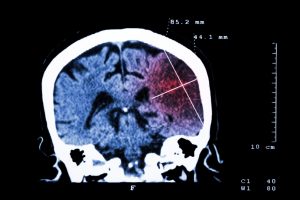 Ischemic stroke risk is linked to traumatic brain injury (TBI), independent of other factors. Lead study author James F. Burke explained, “Both stroke and traumatic brain injury are common, costly, and leading causes of severe disability in adults, and approximately 20 percent of strokes occur in adults under age 65. A large proportion of stroke risk is unexplained, especially in the young, so if we can identify new risk factors, we have the potential to prevent more strokes and improve outcomes.”
Ischemic stroke risk is linked to traumatic brain injury (TBI), independent of other factors. Lead study author James F. Burke explained, “Both stroke and traumatic brain injury are common, costly, and leading causes of severe disability in adults, and approximately 20 percent of strokes occur in adults under age 65. A large proportion of stroke risk is unexplained, especially in the young, so if we can identify new risk factors, we have the potential to prevent more strokes and improve outcomes.”
The researchers looked at records of adults who were admitted into hospital for a brain injury or other traumas that didn’t involve the brain.
Advertisement
The study included 435,630 people with traumatic brain injuries and 736,723 without. Over the course of 28 months, 11,229 people experienced ischemic stroke. Of the TBI group, 1.1 percent had a stroke, compared to only 0.9 percent of those with trauma with no brain injury.
After adjusting for stroke risk factors, those with brain injuries were 30 percent more likely to experience an ischemic stroke, than those with other traumas but no brain injury.
Burke added, “While the stroke risk of one person with TBI is small, the overall link between TBI and stroke was substantial — as large as the link between the strongest stroke risk factor, high blood pressure, and stroke. If further research establishes TBI as a new risk factor for stroke, that would stimulate research to help us understand what causes stroke after TBI and help us learn how to prevent these strokes.”
Tips to minimize risk of stroke
When it comes to stroke prevention, quitting smoking and avoiding secondhand smoke should be your top priority. This is so important because smoking doubles your risk for having a stroke and substantially increases your risk for fatal heart problems such as coronary heart disease. The good news is, it’s never too late to quit. According to The National Stroke Association, a person’s stroke risk is greatly reduced no matter how old they are when they decide to quit smoking.
Although there is some evidence that moderate alcohol consumption can lower heart disease and stroke risk, any potential benefits are negated when you drink too much. Males should not drink more than three alcoholic beverages per day and females should drink no more than two. Any more than that and you increase your heart attack and stroke risk.
Advertisement
Stress can increase blood pressure and cholesterol levels – both of which increase stroke risk. Even more problematic is the fact that stress can make you more prone to developing atherosclerosis (a condition characterized by a narrowing of the arteries), and approximately 80 percent of all strokes are caused by atherosclerosis. Some good ways to reduce stress include sharing your feelings, being more assertive, learning to say no, taking time to laugh, giving yourself some alone time every day, treating yourself to vacations, keeping a journal, taking a bath, meditating, exercising, and doing something that makes you laugh.
Exercise is an essential part of the stroke prevention recipe because it helps to reduce high blood pressure and cholesterol levels, to prevent diabetes, and to reduce stress – all of which are risk factors for heart attack and stroke. Perhaps even more important is the fact that exercise helps you to obtain and/or maintain a healthy body weight, which vastly reduces your stroke risk.
Consuming a healthy diet is arguably the most important thing you can do when it comes to stroke prevention. A healthy diet reduces the same heart attack and stroke risk factors as exercising, but its effects are even more profound. To reduce your stroke risk, start by eliminating or vastly reducing your intake of refined and packaged foods, and base you diet on whole, unprocessed foods instead.
